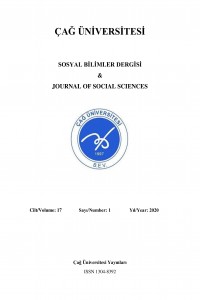İşletmelerde Dijital Dönüşüm ve İlgili Bileşenlerinin Analiz Edilmesi Üzerine Kavramsal Bir Araştırma
Abstract
Günümüzde teknolojik ilerlemeler ve bilgi yönetim sistemlerinin gelişmesi ile dijitalleşme olgusu gündeme gelmiştir. Bu duruma yönelik olarak bilgiyi kullanan ve işleyen işletmeler de mevcut teknolojilerini, çalışma modellerini, süreçlerini yenilemeye çalışarak dijital dönüşüm sürecine adapte olmaya çalışmaktadırlar. Dijital dönüşüm kapsamında işletme modellerinin, altyapıların, ürün, servis ve hizmetlerin şekil değiştirdiği bu süreçte, dijital dönüşümün tam olarak ne anlama geldiği ve işletmelerin hangi kavramlarla uğraştıklarının pek göz önünde bulundurulmadığı görülmektedir. Bu açıdan bakıldığında mevcut araştırmanın temel amacı, dijital dönüşüm kavramının temel unsurlarını ve bileşenlerini, işletmeler açısından inceleyerek, derinlemesine bir bakış açısıyla anlaşılmasını sağlamaktır. Araştırma yönteminde, nicel içerik analizi çerçevesinde ilişkisel yaklaşım, tematik analiz ve makine öğrenmesi kullanılarak, işletmelerde dijital dönüşüm ile ilgili 568 araştırma analiz edilmiş, kavramlar arası bağlantılar kurulmuştur. Araştırma sonucunda işletmeler açısından dijital dönüşüm sürecinde karşılaşılan kavramlar ve kavramlar arasındaki bağlantılar detaylı olarak raporlanmıştır. Ayrıca yıllara göre dijital dönüşüm kavramları incelenmiş, ilgili kavramların teoriden uygulamaya geçişi görselleştirilmiştir.
References
- Apilioğulları, L. (2019). Üretim Endüstrisi Dijital Dönüşüm Süreci Kavramsal İlişki Haritası. Anemon Muş Alparslan Üniversitesi Sosyal Bilimler Dergisi, 7(3):153-162.
- Aydın, E., ve Uğur, U. (2019). İşletmelerde Dijital Dönüşümün Yansımaları. Detay Yayıncılık, Ankara
- Barringer, B. R., Jones, F. F., ve Neubaum, D. O. (2005). A quantitative content analysis of the characteristics of rapid-growth firms and their founders. Journal of business venturing, 20 (5):663-687.
- Bouwman, H., de Vos, H., ve Haaker, T. (2008). Mobile service innovation and business models. Springer Science & Business Media.
- Bouwman, H., Nikou, S., Molina-Castillo, F. J., ve de Reuver, M. (2018). The impact of digitalization on business models. Digital Policy, Regulation and Governance, 20 (2), s:105-124
- Capgemini (2011) Digital Transformation: A Roadmap for Billion-Dollar Organization (Rapor). Capgemini Consulting.
- Del Rowe, S. (2017). Digital transformation needs to happen: the clock is ticking for companies that have been unwilling to embrace change. https://www.destinationcrm.com/Articles, Erişim: 02.04.2020
- Deloitte. (2018). Digital enablement turning your transformation into a successful journey. https://www2.deloitte.com/content/dam/Deloitte/ie/Documents/Technology/IE_C_HC_ campaign.pdf Erişim: 10.05.2020
- Ernst ve Young. (2011). The Digitisation of Everything. How Organisations Must Adapt to Changing Customer Behaviour. https://conference.acfid.asn.au/wp-content/uploads/2017/07/EY_Digiti sation_of_everything.pdf, Erişim: 14.04.2020
- Gandomi, A., ve Haider, M. (2015). Beyond the hype: Big data concepts, methods, and analytics. International journal of information management, 35(2):137-144.
- Guest, G., ve McLellan, E. (2003). Distinguishing the Trees from the Forest: Applying Cluster Analysis to Thematic Qualitative Data. Field Methods, 15(2):186–201.
- Hemerling, J., Kilmann, J., Danoesastro, M., Liza Stutts, L. Ve Ahern, C. (2018). It’s not a digital transformation without a digital culture. https://www.bcg.com/publications/2018/not-digital-transformation-without-digital-culture.aspx, Erişim: 11.03.2020
- Higuchi, K., (2016). A two-step approach to quantitative content analysis. Ritsumeikan Social Sciences Review, 52 (3): 77-89.
- Ismail, M. H., Khater, M., ve Zaki, M. (2017). Digital business transformation and strategy: What do we know so far? https://cambridgeservicealliance.eng.cam.ac.uk/resources/Downloads/Monthly%20Papers/2017NovPaper_Mariam.pdf. Erişim: 03.03.2020
- Kane, G.C., Palmer, D., Phillips, A.N., Kiron, D., ve Buckley, N. (2015). Strategy, not technology, drives digital transformation. MIT Sloan Management Review and Deloitte University Press, 14:1-25.
- Klein, M. (2020). İşletmelerin Dijital Dönüşüm Senaryolari-Kavramsal Bir Model Önerisi. Electronic Journal of Social Sciences, 19(74):997-1019
- Kotarba, M. (2018). Digital transformation of business models. Foundations of Management, 10(1):123-142.
- Liu, D., Chen, S. ve Chou, T. (2011). Resource Fit in Digital Transformation: Lessons Learned From The CBC Bank Global E-Banking Project, Management Decision, 49 (10):1728-1742.
- Lucas, H.C., Clemons, E.K., Sawy, O.A. ve Weber, B. (2013). Impact Research On Transformational Information Technology: An Opportunity to Inform New Audiences. MIS Quarterly, 37(2):371-382.
- Özispa, N. ve Akdaş, O. (2019). Dijital Dönüşüm Konusunda Yapilmiş Çalişmalarin Lisansüstü Tezlere Dayali Bibliyometrik Analizi. Mersin Üniversitesi Denizcilik ve Lojistik Araştırmaları Dergisi, 1(1):60-75.
- Piccinini, E., Gregory, R.W. ve Kolbe, L.M. (2015). Changes in the Producer-Consumer Relationship: Towards Digital Transformation. Wirtschaftsinformatik Proceedings, 109:1634-1648.
- Riffe, D., Lacy, S., Fico, F. ve Watson, B. (2019). Analyzing media messages: Using quantitative content analysis in research. Routledge.
- Salkın, C., Öner, M., Üstündağ, A. ve Çevikcan, E. (2017). A Conseptual Framewok for Industry 4.0. A. Üstündağ ve E. Çevikcan (Ed.), Industry 4.0: Managing the digital transformation. Springer.
- Schallmo, D. R., ve Williams, C.A. (2018). Digital Transformation Now!: Guiding the Successful Digitalization of Your Business Model. Springer.
- Schuchmann, D. ve Seufert, S. (2015). Corporate Learning in Times of Digital Transformation: A Conceptual Framework and Service Portfolio for the Learning Function in Banking Organizations. iJAC, 8 (1):31-39.
- Schwertner, K. (2017). Digital transformation of business. Trakia Journal of Sciences, 15(1):388-393.
- Stolterman, E. ve Fors, A.C. (2004). Information Technology and the Good Life. Information Systems Research: Relevant Theory and Informed Practice. London: Kluwer Academic Publishers.
- Karaçay, G. ve Aydın, B. (2017). Internet of Things and New Value Proposition. A. Üstündağ ve E. Çevikcan (Ed.), Industry 4.0: Managing the digital transformation. Springer.
- Westerman, G., ve Bonnet, D. (2015). Revamping your business through digital transformation. MIT Sloan Management Review, 56(3).
Details
| Primary Language | Turkish |
|---|---|
| Journal Section | Research Article |
| Authors | |
| Publication Date | June 29, 2020 |
| Published in Issue | Year 2020 Volume: 17 Issue: 1 |

